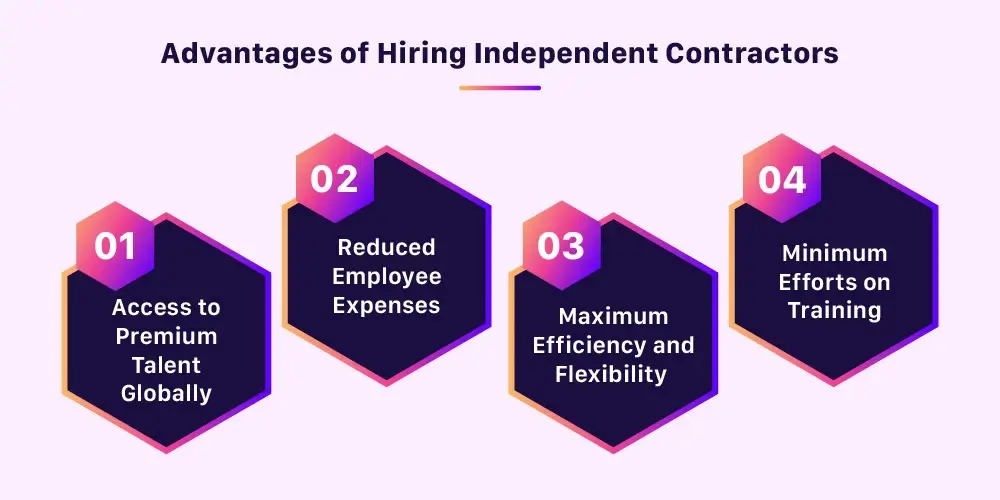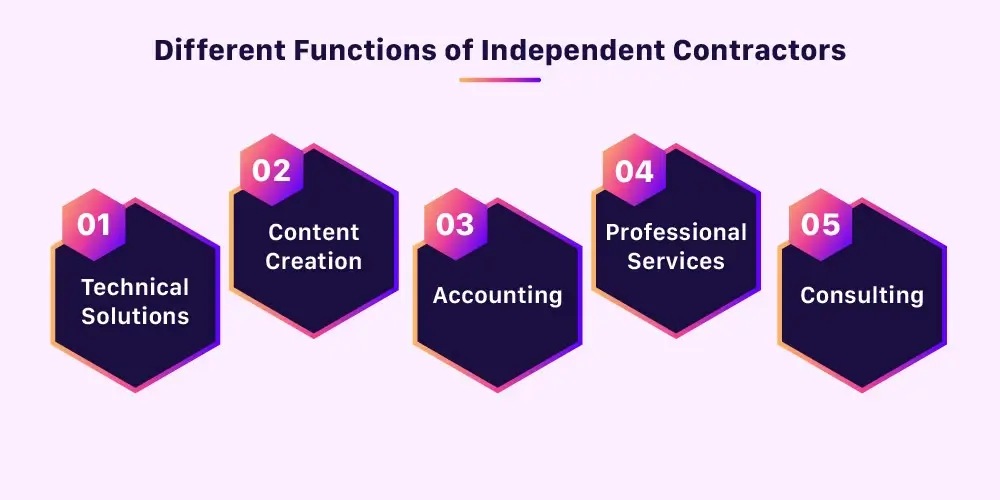1. Access to Premium Talent Globally
Organizations can explore the diverse talent pool without any geographical barriers while hiring an independent contractor. This allows expert professionals from any location to work on a specific project without the need to be physically present in the hiring office location.
This way companies do not have to face any talent shortages at any given time. Also, as companies hire independent contractors for a project-specific time mostly, they can be flexible with their workforce and discontinue the term of a contract with an independent contractor in case the business or project requirements are not met as per expectations.
Additionally, the highly competitive market of independent contractors allows each one of the employees in the contract to give their best at work and bring out the most hidden skills within them to add the highest value to a certain project.
2. Reduced Employee Expenses
Companies have to bear numerous long-term expenses for their full-time employees which include employee benefits, employee training and development, workspace tools and infrastructure, and the most complex of all, employee taxes. By hiring independent contractors, companies not only save on employee-related operational expenses but also a huge deal on employee payroll and taxes.
Since the contractors are not added to the company payroll, paying taxes, health insurance and other added perks stay off the charts. Further, unlike permanent employees, independent contractors are paid project-based salaries which involve factors like the timeline and demand for the project.
This frees up the companies from any long-term expenses towards the hired contractors. Thus hiring independent contractors ensures maximum efficiency with minimum financial commitment.
3. Maximum Efficiency and Flexibility
Independent contractors are well experienced in working with short turnaround times yet bringing out the best solutions and unique perspectives within limited timelines. Hailing from a diverse range of career backgrounds, they need little to no training to adopt the new project requirements and are flexible in delivering any kind of expertise or requirements the concerned project demands.
This ensures speedy delivery and maximum efficiency of work. Additionally, companies can be really flexible with resource allocation if they plan to hire contractors for a specific project. This flexibility enables companies to appoint only the most suitable candidates for the project as well as maintain quality work among the team of contractors.
4. Minimum Efforts on Training
Independent contractors are well versed in the project requirements and expertise required in various industries to deliver an exceptionally high-value output. This is mainly because they are experienced in working for multiple domains and industries. They also keep themselves updated about the latest skills and trends in their career path to stay at the top of the game.
This significantly reduces the learning curve for them and consequently, the need to provide training and development support by the hiring organization. Thus organizations can successfully save on hiring resources and allocating time just for training and supervision purposes. Independent contractors are meticulously capable of working on a project immediately after joining yet executing it smoothly and effectively.
Concerns About Hiring an Independent Contractor
While the advantages of hiring an independent contractor always carry more weight, there are a few concerns as well to pay attention to before hiring one. The major concern is the hiring company merely has no control over their work specifications or timelines as they are not permanent employees. Additionally, being self-employed professionals, independent contractors have the freedom to choose their working methods and clients. This can lead to potential threats to the IP protection of the concerned company and non-compliance with the legal laws of the contract.
Also, many a time the contractors fail to understand the organization’s culture and vision which leads to misalignment with the project goals and delivery. There is also a good chance of miscommunication and worker misclassification in the case of foreign independent contractors. Let us discuss in detail the major issues faced by organizations when they plan to hire a contractor for their teams.
Engagement and Retention
The lack of proper communication and continued emotional engagement with other team members or company colleagues disrupts the motivation to work productively for a long time on a project. This leads to a constant hunger for more and imbalanced stability among the independent contractors which in turn leads to higher attrition rates.
It becomes difficult and expensive for the company to hire a new resource in the middle of an ongoing project. It becomes even more difficult to engage the new resource halfway with other team members, both emotionally and professionally. This cycle of onboarding and offboarding repeats itself making it a nightmare for companies at times.
All this puts a hindrance to the smooth and efficient execution of the ongoing project, often leading to incomplete and low-quality product delivery by the team.
Worker Misclassification
It is crucial to understand that each individual country has its own unique set of labor laws and regulations. When a company plans to hire a contractor from a foreign country and is not thorough with employee rights, there is a great chance of misclassifying a full-time employee as an independent contractor.
This not only rips off the misclassified workers from receiving employee benefits and insurance but also poses heavy reputational damage to the hiring company. The major problems faced by the hiring company for wrongly classifying an employee are financial and legal penalties.
Worker misclassification can impose heavy fines on the company which includes employee taxes and unpaid benefits. Thus without a proper agreement between the employer and the contractor, it is tough to be fully compliant with the legal labor laws in a foreign country.
Copyright Infringement Risks
As independent contractors are self-employed workers, technically they own the copyright of every creative or intellectual work they produce. Independent contractors can reserve their right to the work they have done in case of any disagreement or clash between the contractor and the company.
Without the proper legal agreement of owning the intellectual properties by default created by the contractors, companies may fail to utilize them properly or in the worst case at all. Independent contractors may also sue the hiring company for incorrectly utilizing or modifying their produced content if not legally bound. These disputes in copyright ownership heavily impact the output of the project at hand and the company’s business at large.
Legal and Compliance Risks
The liability and obligations of independent contractors towards the hiring company are often substantially lower than those of full-time employees. They often fail to comply with the legal standards of the organization and other related labor laws. However, it is the company that has to take the blow on their behalf.
Companies can face challenges while deciding the salaries of foreign independent contractors, onboarding the contractors, or offboarding them for the wrong reasons. There are increasing chances of overlooking the loopholes in the agreement while hiring an independent contractor as these types of employment agreements are more transient and divergent. Complying with diverse laws and regulations in a foreign country is difficult per se and adding independent contractors to the team makes it more complex.
Liability Issues
The major concern in hiring an independent contractor is that they are free to work with more than one client at a time. This could potentially lead to confidentiality breaches, conflict of interest, or a negative impact on work quality. Moreover, independent contractors mostly work on their own technical resources and tools.
This makes it difficult for the companies to maintain proper IP protection and strict security for their company data. Additionally, as independent contractors are not added to the payroll or do not have access to employee benefits, they can demand some unfair and added benefits to their worker compensation. All these factors convert an independent contractor to liability more than an asset to the hiring company.
The Remunance team being the local experts has been hiring and managing independent contractors for multiple foreign clients for a decade now. Learn how they are tactfully addressing the concerns regarding hiring and managing independent contractors in India.








 Schedule a free call
Schedule a free call